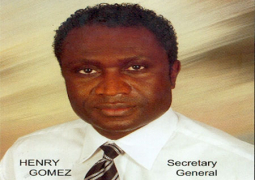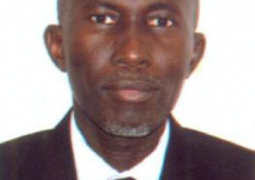Halimatou
Ceesay
Sub-Inspector
Samba Bah, a PIU officer, yesterday told the court during cross-examination
that he was not aware of the 10,000 man match-past in The Gambia condemning
military coup.
He
was responding to a question from defence counsel B.S. Touray, in the criminal
trial involving 14 supporters of the United Democratic Party (UDP) before
Justice O. Ottaba of the Special Criminal Court in Banjul.
The
accused persons are Bakary Jammeh, Kaddy Samateh, Lele Bojang, Alkali Sanneh,
Yaya Fatty, Muhammed Singhateh, Kemo Touray, Bakary Marong, Buba Mass, Alagie
Saidykhan, Tombong Njie, Modou Sarr, Sheriff Suma, and Lamin Dampha
They
are being tried on a seven-count charge of conspiracy to commit felony,
unlawful assembly, and riot, incitement of violence, interfering with vehicles,
holding a procession without a permit and disobeying an order to disperse.
When
the case was called, B. Jaiteh and Sanneh appeared for the state, whilst the
defendants were represented by A. Sisay-Sabally, B.S. Touray, Y. Senghore, C.
Gaye and A. Njie.
Continuing
cross-examination, defence counsel B.S. Touray asked the witness: “You remember
we have several pro-government demonstrations in the country in the past?”
“I
cannot remember. I know of this one.”
“I
mean demonstrations organised by the government itself, that is what I mean by
pro-government.”
“I
am not aware of any demonstration organised by the government.”
“How
about match-past or procession being organised by government, are you aware of
that?”
“No.”
“You
mean you are not aware of the 10, 000 man match-past organised in the country
condemning military coup?”
“No.”
“You
don’t remember the match-past organised condemning the 17 points EU Human
Rights demand on Gambia Government?”
“No.”
“You
will agree with me that even as you don’t remember those occasions, but it is
true that the para-military were not mobilised to disrupt these processions and
arrest participants in them?”
“They
were not arrestable demonstrations.”
“On
this day, did you have any complaints from any member of the public that his or
her vehicle was commandeered? “
“No.”
“Did
you also received any complaints from the PIU or by any member of the public
that his or her vehicle has been damaged by any group?”
“Not
to my knowledge.”
“Were
any of your security or patrol vehicles damaged by this group on this day?”
“I
am not aware.”
“Did
you receive any complaints from government that any of their official vehicles
have been commandeered by these people on that day?”
“Not
to my knowledge.”
“Did
you also receive a formal complaint from any member of the public complaining
of any traffic blockage?”
“Yes.”
“Can
you give me the names of such one complainant?”
“No.”
“You
spoke about passers-by can you estimate the size of the crowd you refer to as
passers-by?”
“I
don’t exactly know how many, but it happened on a public highway.”
“These
passers-by were passing by on a public highway. Isn’t that right?”
“Yes.”
“Did
they stop to watch what was going on?”
“Yes.”
“Do
you know who they were?”
“No.”
“Do
you know their party affiliation?”
“No.”
“Do
the passers-by have any feature of identification?”
“I
don’t observe that.”
“Do
you arrest anyone with any party flag?”
“Yes.”
“And
who was this person?”
“I
can’t identify any of them?
“Do
you find any party identity card on anyone?”
“I
don’t see any of them with any party identity card.”
“Do
you know the names of all those who were part of the two platoons?”
“I
can’t remember.”
“Are
you telling the court that you don’t know the names of your colleagues?”
“I
cannot remember all those who participated in the arresting, on that day.”
Hearing
continues today at 4pm.



